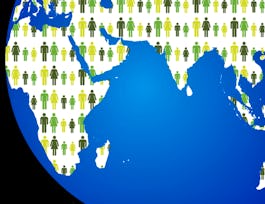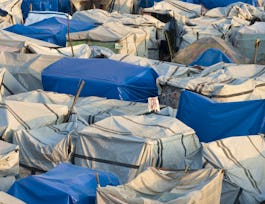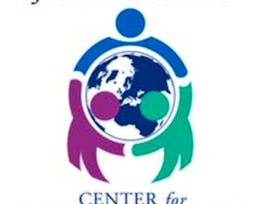This course, Public Health in Humanitarian Crises 1, introduces discussions about the public health approach to problems experienced by people affected by disasters, both natural and related to conflict. The course discusses the many changes which occur in people’s lives when they are uprooted by a disaster, ranging from changes in disease patterns, access to health care, livelihoods, shelter, sanitary conditions, nutritional status, etceteras. We will explore what humanitarian interventions could look like if we want to mitigate the effects of disasters. The course content is a mix of theoretical knowledge and many practical examples from recent disasters. We think this course is unique because it contains so many practical ‘real-life’ examples and is taught by instructors and guest lecturers who together have over 200 years of experience in this field.


Public Health in Humanitarian Crises 1
This course is part of Foundations of Global Health Specialization
Taught in English
Some content may not be translated


Instructors: Gilbert Burnham, MD
19,131 already enrolled
Included with 
Course
(540 reviews)
99%
Skills you'll gain
Details to know

Add to your LinkedIn profile
10 quizzes
Course
(540 reviews)
99%
See how employees at top companies are mastering in-demand skills

Build your subject-matter expertise
- Learn new concepts from industry experts
- Gain a foundational understanding of a subject or tool
- Develop job-relevant skills with hands-on projects
- Earn a shareable career certificate


Earn a career certificate
Add this credential to your LinkedIn profile, resume, or CV
Share it on social media and in your performance review

There are 10 modules in this course
In this module we will define what we mean by disasters, hazards, risks and vulnerabilities. We look at patterns and trends and understand the role of public health in disasters.
What's included
6 videos4 readings1 quiz
There are many humanitarian actors that play a role in a disaster. This module describes many of them and also looks at various coordination models that are used.
What's included
6 videos1 reading1 quiz1 discussion prompt
This module describes the burden of, and mechanisms of, sanitation and water-related diseases in humanitarian crises. We also illustrate the various strategies and priorities that can be used to reduce outbreaks of those diseases.
What's included
5 videos1 reading1 quiz
Disasters affect livelihoods. This module illustrates how and what livelihoods strategies families use to cope with a crisis. We also describe what food security entails and ways to assess it. We look at various livelihoods support programs that can be used in disaster settings.
What's included
4 videos1 quiz1 discussion prompt
This module looks at who is at risk to become malnourished in a disaster context and why that is the case. We will describe various types of malnutrition, the treatment and various preventative actions.
What's included
5 videos1 quiz1 discussion prompt
This module examines the patterns of disease in affected populations. We will understand how the changes in population characteristics as well as life styles have changed the nature of the burden of disease populations from that of predominantly communicable to a pattern of non communicable diseases.
What's included
4 videos1 quiz
Disasters put special strains on the provision of health services as demands increase and resources to meet these needs diminish. The six major components of health services may be each damaged in different ways, and all can require urgent attention. This is all discussed in this module.
What's included
5 videos1 quiz
In this module we talk about shelter and what it means. We describe how and which shelter solutions contribute towards immediate and longer-term recovery of people affected by disasters.
What's included
3 videos1 reading1 quiz1 discussion prompt
Many disasters cause populations to be displaced. The module on the protection of displaced populations explores the international protection of individuals in relation to public health, human rights, and international humanitarian law.
What's included
7 videos1 reading1 quiz1 discussion prompt
The potential for future disasters is great, and each having important public health components. New resources and new approaches will be needed to address these disasters and to help countries to recover economies and livelihoods. This module discusses the challenges and future directions in humanitarian assistance.
What's included
6 videos1 quiz1 peer review
Instructors


Offered by
Recommended if you're interested in Governance and Society

Johns Hopkins University

Emory University

Johns Hopkins University

Columbia University
Why people choose Coursera for their career




Learner reviews
Showing 3 of 540
540 reviews
- 5 stars
86.11%
- 4 stars
12.59%
- 3 stars
0.74%
- 2 stars
0.37%
- 1 star
0.18%

Open new doors with Coursera Plus
Unlimited access to 7,000+ world-class courses, hands-on projects, and job-ready certificate programs - all included in your subscription
Advance your career with an online degree
Earn a degree from world-class universities - 100% online
Join over 3,400 global companies that choose Coursera for Business
Upskill your employees to excel in the digital economy
Frequently asked questions
You do not have to pay for this course if you choose to enroll without a certificate. Sometimes referred to as auditing, enrolling without a certificate means that you will have access to all of the videos, readings, and discussions. The only difference is that you will not be able to complete graded assignments or receive a certificate upon completion. Click the Audit link to sign up and begin the course.
Access to lectures and assignments depends on your type of enrollment. If you take a course in audit mode, you will be able to see most course materials for free. To access graded assignments and to earn a Certificate, you will need to purchase the Certificate experience, during or after your audit. If you don't see the audit option:
The course may not offer an audit option. You can try a Free Trial instead, or apply for Financial Aid.
The course may offer 'Full Course, No Certificate' instead. This option lets you see all course materials, submit required assessments, and get a final grade. This also means that you will not be able to purchase a Certificate experience.
When you enroll in the course, you get access to all of the courses in the Specialization, and you earn a certificate when you complete the work. Your electronic Certificate will be added to your Accomplishments page - from there, you can print your Certificate or add it to your LinkedIn profile. If you only want to read and view the course content, you can audit the course for free.

